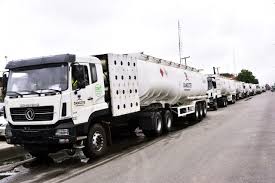Barring any last-minute change, the Dangote Petroleum Refinery is set to begin its direct fuel distribution scheme soon as 1,000 Compressed Natural Gas-powered trucks ordered for the project have arrived in Nigeria.
The refinery, which is located in Lekki, Lagos, had earlier planned to launch the distribution exercise on August 15, 2025, with 4,000 trucks but could not meet the date due to logistics delays in China. The company explained that the delay was caused by a shortage of vessels to move the trucks from China to Nigeria.
Impeccable sources at the $20 billion facility disclosed that the refinery now has 1,000 trucks ready for use, and the remaining 3,000 trucks are expected to arrive before the end of September. They said more trucks had been coming into the country in batches, with the first shipment bringing in 200, the second 250, and another 150 arriving shortly after.
According to one senior official, “We could not begin the scheme earlier because there were not enough ships to move 4,000 trucks at once. As of now, 1,000 trucks have been received and more are coming. By the end of September, we believe all 4,000 trucks will be here.”
Officials of the refinery also confirmed that distribution will start with Lagos and other South-West states before expanding to other zones as more trucks arrive. A consultant to the company said all the trucks had been paid for and were available in China, only waiting for vessels to move them to Nigeria.
“We are starting soon with the 1,000 trucks available, and Nigerians should bear with us as we scale up. The South-West will be the first area of coverage before we move to other regions. We are certain that by September, major parts of the country will be covered,” one source explained.
The company had earlier revealed that it was expecting about 60 shiploads of trucks within six weeks to meet the target. In June, Dangote announced an investment of over ₦720 billion to deploy the 4,000 CNG-powered trucks across the country.
The project, according to Dangote, will save Nigerians over ₦1.7 trillion annually in distribution costs. The company also said it would absorb over ₦1.07 trillion every year in fuel logistics expenses, thereby reducing costs for businesses and individuals.
Dangote Industries explained that the programme would benefit over 42 million micro, small, and medium enterprises by cutting their energy expenses and improving profitability. It also promised to create more than 15,000 direct jobs for truck drivers, filling station managers, attendants, and other workers within the logistics chain.
The company further noted that the scheme would reduce smuggling of fuel across borders, revive dormant filling stations, and make fuel distribution more efficient and environmentally friendly.
When the initiative was first announced in March, Dangote had stated that fuel would be supplied directly to filling stations, telecommunication companies, and large bulk users, thereby cutting off middlemen.
However, this raised concerns among existing fuel suppliers and tanker drivers, who feared the plan could put them out of business. The Natural Oil and Gas Suppliers Association of Nigeria (NOGASA) and the National Association of Road Transport Owners (NARTO) had earlier warned that the move could cause disruption, scarcity, and collapse of the existing distribution system.
Following the concerns, Dangote later held discussions with the groups. The National Publicity Secretary of NOGASA, Chinedu Ukadike, and the National President of NARTO, Yusuf Othman, confirmed that the parties had met to iron out their differences.
With the arrival of 1,000 trucks and expectations of 3,000 more before the end of September, the Dangote Refinery appears set to finally roll out its long-awaited direct fuel distribution scheme in Nigeria.
